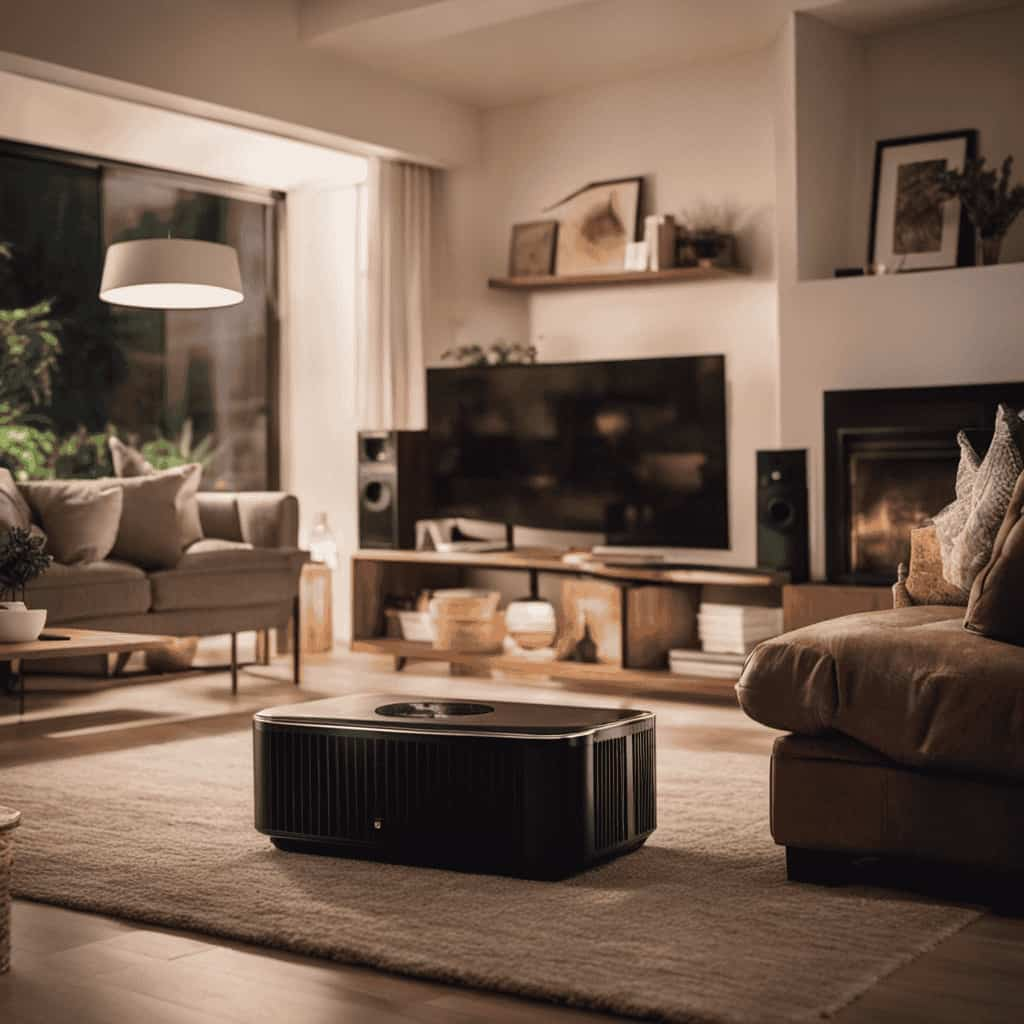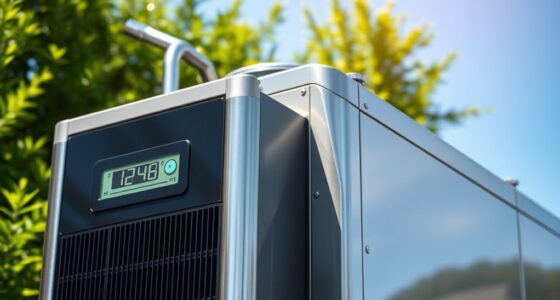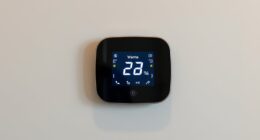Have you ever heard the expression ‘money doesn’t grow on trees’? What if there was a way to cut your expenses and save up to 70% on your HVAC system?
Enter heat pump HVAC systems. In this article, we’ll dive into the energy efficiency and cost-saving benefits of these innovative systems.
Plus, we’ll share tips for maximizing your savings and explore the environmental impact.
Get ready to invest in the future and start reaping the long-term rewards of heat pump HVAC systems.

Key Takeaways
- Heat pump HVAC systems can lower monthly utility bills by up to 70%.
- Heat pumps achieve energy efficiency benefits compared to traditional HVAC systems.
- Heat pump systems offer a high return on investment, recouping initial costs through energy savings.
- Heat pump systems help reduce reliance on fossil fuels and contribute to a cleaner environment.
How Heat Pump HVAC Systems Can Save You Money
We can save money with heat pump HVAC systems by reducing our energy consumption. Heat pumps are known for their benefits of energy efficient heating, making them an ideal choice for homeowners looking to cut down on their energy bills.
Unlike traditional HVAC systems that rely on burning fuel to generate heat, heat pumps transfer heat from one area to another using electricity. This process is much more efficient, as it doesn’t require the constant use of fossil fuels. By utilizing the heat already present in the air or ground, heat pumps can provide the same level of comfort at a fraction of the energy cost.
This means substantial savings on your monthly utility bills while reducing your carbon footprint.
Understanding the Energy Efficiency of Heat Pump HVAC Systems
By understanding the energy efficiency of heat pump HVAC systems, we can make informed choices to maximize our savings on energy bills. Heat pump systems offer significant energy efficiency benefits compared to traditional HVAC systems. They achieve this by utilizing advanced technology that allows them to transfer heat rather than generate it, resulting in less energy consumption.

To better understand the technology behind heat pump systems, let’s take a look at the following table:
| Technology | Efficiency Benefits |
|---|---|
| Heat Transfer | Heat pump systems transfer heat from one area to another, reducing the need to generate heat. This results in lower energy consumption and decreased utility bills. |
| Variable Speed Compressor | Heat pumps use variable speed compressors, which adjust their output based on the heating or cooling demands, leading to optimized energy usage. |
| Dual Fuel Capability | Heat pumps can work in conjunction with a gas furnace or electric resistance heater, allowing for efficient performance in extreme temperatures. |
The Cost-Saving Benefits of Heat Pump HVAC Systems
Heat pump HVAC systems offer significant cost-saving benefits through their energy efficiency advantages. With their ability to transfer heat rather than generate it, these systems can lower monthly utility bills by up to 70%.
This translates to long-term cost savings for homeowners, making heat pump HVAC systems a smart investment for those looking to reduce their energy expenses.
Energy Efficiency Advantages
Our energy-efficient heat pump HVAC systems offer significant cost-saving benefits. These systems are designed to maximize energy efficiency, resulting in lower utility bills and reduced environmental impact.

By utilizing the heat transfer process, heat pumps can extract heat from the air or ground and transfer it into your home, providing cost-effective heating and cooling solutions throughout the year. Compared to traditional heating and cooling systems, heat pumps can achieve energy efficiency benefits of up to 70%, leading to substantial savings on your energy bills.
In addition to lower operating costs, heat pump systems also require minimal maintenance, further reducing your overall expenses. With their advanced technology and energy-saving capabilities, heat pump HVAC systems are a smart choice for homeowners looking to save money and reduce their carbon footprint.
Transitioning into the next section, let’s explore how these energy-efficient systems can lead to lower monthly utility bills.
Lower Monthly Utility Bills
We can achieve significant savings on our monthly utility bills by installing a heat pump HVAC system.

Here are three tips for reducing energy consumption and maximizing energy efficiency:
Optimize temperature settings: Set your thermostat to a comfortable but energy-saving temperature. Lowering the temperature by just a few degrees can result in substantial energy savings.
Regular maintenance: Schedule annual maintenance for your heat pump HVAC system. Cleaning and servicing the system can improve its efficiency and prevent any potential issues that could lead to higher energy consumption.
Insulation: Proper insulation in your home helps to keep the cool air inside during hot summers and the warm air inside during cold winters. This reduces the workload on your heat pump HVAC system and saves energy.

Long-Term Cost Savings
By utilizing a heat pump HVAC system, homeowners can experience significant long-term cost savings on their energy bills. Heat pump systems are designed to maximize efficiency, ensuring that every unit of energy consumed is effectively utilized. This means that homeowners can enjoy reduced energy consumption and lower utility bills over the long term.
Additionally, heat pump systems offer a high return on investment. While the upfront cost of installing a heat pump HVAC system may be higher compared to traditional systems, the long-term savings on energy bills make it a worthwhile investment. Homeowners can expect to recoup their initial investment through energy savings within a few years of installation.
With its ability to provide efficient heating and cooling, a heat pump HVAC system offers homeowners the opportunity to save money in the long run while enjoying optimal comfort in their homes.
Tips for Maximizing Savings With Heat Pump HVAC Systems
One of the most effective ways to maximize savings with heat pump HVAC systems is by properly maintaining and regularly servicing the equipment. Here are some tips for installation, maintenance, and repairs of heat pump HVAC systems to help you maximize energy efficiency:

Hire a professional for installation: A properly installed heat pump system will ensure optimal performance and energy efficiency.
Regularly clean and replace filters: Dirty filters can restrict airflow and reduce the system’s efficiency. Clean or replace them as recommended by the manufacturer.
Schedule regular maintenance: Professional maintenance can identify and fix any issues early on, improving the system’s efficiency and preventing costly repairs.
By following these tips, you can ensure that your heat pump HVAC system operates at its maximum efficiency, helping you save on energy costs.

Now, let’s compare the energy usage of heat pump systems to traditional HVAC systems.
Comparing Energy Usage: Heat Pump Vs. Traditional HVAC Systems
When comparing energy usage, heat pump HVAC systems are more efficient and cost-effective than traditional HVAC systems.
Heat pumps operate by transferring heat from one place to another, rather than generating heat themselves, making them significantly more energy-efficient.
Traditional HVAC systems, on the other hand, use fuel or electricity to generate heat, resulting in higher energy consumption and increased costs.

In terms of energy efficiency, heat pumps can provide up to 70% savings compared to traditional systems.
Additionally, heat pumps offer the advantage of providing both heating and cooling functions, eliminating the need for separate systems.
Although heat pump HVAC systems may have a higher upfront cost, the long-term savings in energy usage make them a more economical choice for homeowners.
The Environmental Impact of Heat Pump HVAC Systems
Since heat pump HVAC systems transfer heat instead of generating it, they have a significantly lower environmental impact compared to traditional systems. Here are three key environmental benefits of heat pump HVAC systems:

Carbon footprint reduction: Heat pump systems operate by extracting heat from the air, ground, or water, and then transferring it into the building. This process consumes far less energy compared to traditional systems that rely on burning fossil fuels. As a result, heat pump systems produce fewer carbon emissions, helping to reduce the overall carbon footprint.
Energy efficiency: Heat pump systems are highly efficient, meaning they can provide the same level of heating or cooling with less energy consumption. This not only saves money on utility bills but also reduces the demand for electricity, which in turn decreases the environmental impact associated with energy production.
Renewable energy compatibility: Heat pump systems are compatible with renewable energy sources such as solar and geothermal energy. By integrating heat pumps with renewable energy systems, it is possible to further reduce reliance on fossil fuels and promote a more sustainable and environmentally friendly approach to heating and cooling.
Investing in the Future: The Long-Term Savings of Heat Pump HVAC Systems
When it comes to investing in the future, heat pump HVAC systems offer a cost-effective energy solution that can lead to reduced monthly utility bills. These systems not only provide comfortable heating and cooling, but they also contribute to a more environmentally friendly home.

By utilizing renewable energy sources like air or ground, heat pumps can significantly reduce greenhouse gas emissions and help combat climate change.
With long-term savings and a positive impact on the environment, heat pump HVAC systems are a smart choice for homeowners looking to invest in a sustainable future.
Cost-Effective Energy Solution
We can achieve significant long-term savings by investing in heat pump HVAC systems as a cost-effective energy solution. Heat pumps are an energy efficient technology that provide both heating and cooling capabilities for residential and commercial buildings. Here are three reasons why heat pump HVAC systems are a cost-effective choice:
Energy Efficiency: Heat pumps work by transferring heat from one area to another, rather than generating heat. This results in less energy consumption compared to traditional HVAC systems, leading to lower utility bills and reduced carbon footprint.

Affordable Heating: Heat pumps are especially effective in providing affordable heating during colder months. By extracting heat from the outdoor air or ground, heat pumps can produce up to three times more heat energy than the electrical energy they consume.
Long-Term Savings: While heat pump HVAC systems may have a higher upfront cost, the long-term savings are significant. With lower energy consumption and reduced maintenance needs, heat pumps can result in savings of up to 70% on heating and cooling costs over time.
Investing in a heat pump HVAC system is a smart choice for those looking for a cost-effective and energy efficient solution for their heating and cooling needs.
Reduced Monthly Utility Bills
By investing in heat pump HVAC systems, homeowners can enjoy a substantial 70% reduction in their monthly utility bills. Heat pump systems are energy efficient home upgrades that not only save money but also contribute to reducing carbon footprint.

These systems work by transferring heat from the air or ground to warm or cool the home, using significantly less energy compared to traditional heating and cooling systems. With their high efficiency and ability to provide both heating and cooling, heat pumps are an excellent long-term investment for homeowners looking to reduce their monthly utility costs.
In addition to the financial savings, heat pump HVAC systems help to create a more sustainable and environmentally friendly living space. By reducing energy consumption, homeowners can make a positive impact on the environment while enjoying the benefits of reduced monthly utility bills.
Environmentally Friendly Heating
Investing in heat pump HVAC systems allows us to achieve environmentally friendly heating while enjoying the long-term savings they provide. These systems are energy efficient alternatives to traditional heating methods, making them a sustainable heating option for the future.
Here are three reasons why heat pump HVAC systems are environmentally friendly:

Reduced carbon emissions: Heat pumps use electricity to transfer heat instead of burning fossil fuels, resulting in lower carbon emissions. This helps to reduce our carbon footprint and contribute to a cleaner environment.
Renewable energy compatibility: Heat pumps can be powered by renewable energy sources such as solar or wind power. This makes them even more environmentally friendly as they can operate using clean, sustainable energy.
Efficient use of energy: Heat pumps are designed to be highly efficient, extracting heat from the air or ground to heat our homes. This means they require less energy to produce the same amount of heat, leading to lower energy consumption and reduced environmental impact.
Exploring Government Incentives for Heat Pump HVAC Systems
Government incentives play a crucial role in promoting the adoption of heat pump HVAC systems and driving energy efficiency. These incentives are designed to encourage homeowners and businesses to invest in these systems by providing financial savings.

One such incentive is the federal tax credit, which offers a percentage of the cost of the system as a tax deduction. Additionally, many state and local governments offer rebates or grants for the installation of heat pump HVAC systems. These incentives are often based on the system’s energy efficiency, with higher efficiency systems receiving greater financial benefits.
Case Studies: Real-Life Savings With Heat Pump HVAC Systems
We’ve seen significant cost savings in real-life scenarios with heat pump HVAC systems. Here are three case studies that demonstrate the effectiveness of heat pump systems in maximizing savings:
Residential Home: A family in a cold climate installed a heat pump HVAC system, replacing their old furnace. They saw a 50% reduction in their heating bills, resulting in annual savings of $1,200.
Commercial Office: An office building upgraded their HVAC system to a heat pump. They experienced a 40% decrease in their energy consumption, leading to savings of $10,000 per year.

Retail Store: A retail store in a hot climate replaced their air conditioning units with heat pump systems. They achieved a 60% reduction in cooling costs, saving $5,000 annually.
These real-life case studies highlight the potential for significant savings by switching to heat pump HVAC systems. By maximizing energy efficiency and reducing utility bills, heat pumps offer a cost-effective solution for both residential and commercial properties.
Frequently Asked Questions
How Long Does It Typically Take to Recoup the Initial Cost of Installing a Heat Pump HVAC System?
It typically takes a few years to recoup the initial cost of installing a heat pump HVAC system. However, the long-term cost effectiveness and energy savings make it a worthwhile investment.
Can a Heat Pump HVAC System Be Installed in Any Type of Home or Building?
Heat pump HVAC systems are suitable for most homes and buildings. They offer significant energy savings, resulting in lower bills. When considering installation, it’s important to compare the cost with potential long-term savings.

Are There Any Maintenance Requirements for Heat Pump HVAC Systems?
Maintenance requirements for heat pump HVAC systems include regular filter cleaning and annual professional inspections. With these simple tasks, you can ensure optimal performance and enjoy the benefits of energy savings and efficient heating and cooling.
Can a Heat Pump HVAC System Be Used for Both Heating and Cooling Purposes?
Yes, a heat pump HVAC system can be used for both heating and cooling purposes. Heat pump efficiency allows for energy savings and the advantages of heat pumps include year-round comfort and reduced utility bills.
Are There Any Tax Credits or Rebates Available for Installing a Heat Pump HVAC System?
Tax incentives and rebates may be available for installing an energy-efficient heat pump HVAC system. These incentives can help offset the initial cost and encourage the use of more environmentally friendly heating and cooling solutions.
Are the Top Energy-Efficient Heat Pump HVAC Systems Known for Their Cost Savings?
Are the top energy-efficient heat pump hvac systems known for their cost savings? These innovative systems are designed to maximize energy efficiency, helping homeowners save on their utility bills. By utilizing advanced technology and intelligent controls, energy-efficient heat pump HVAC systems offer significant cost savings while providing optimal comfort levels year-round.
Conclusion
In conclusion, heat pump HVAC systems offer significant savings in energy costs, with potential savings of up to 70%.

While some may argue that the initial investment is high, the long-term savings and environmental benefits make it a worthwhile investment.
By maximizing the energy efficiency of these systems and taking advantage of government incentives, homeowners can enjoy both financial and environmental advantages.
Don’t let the upfront cost deter you; the savings and advantages of heat pump HVAC systems are undeniable.









